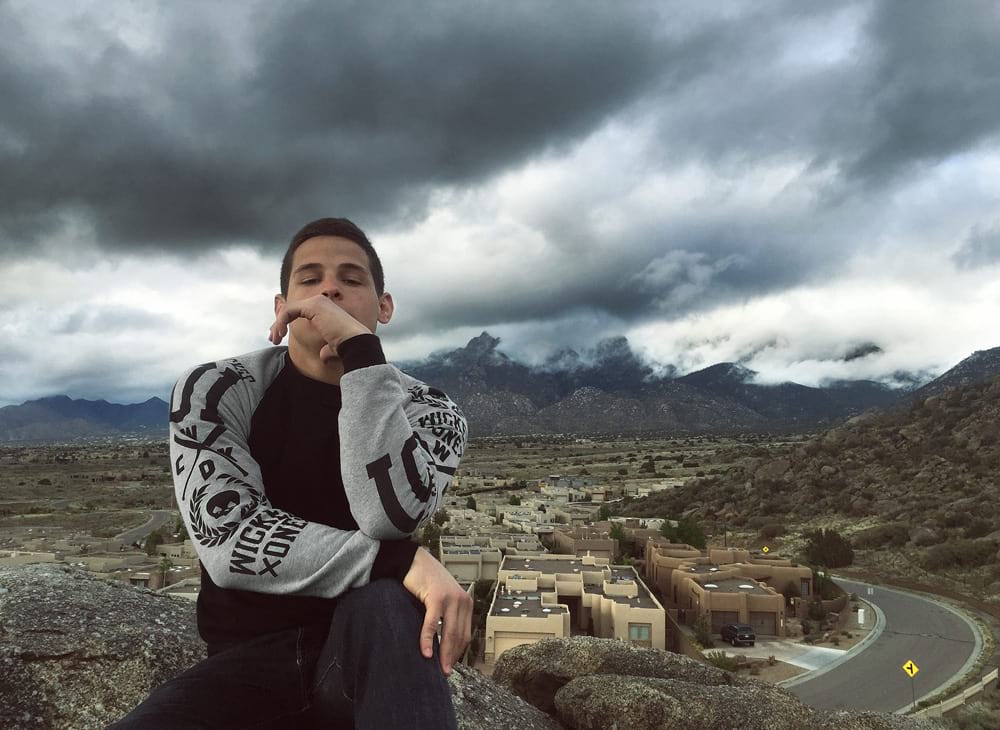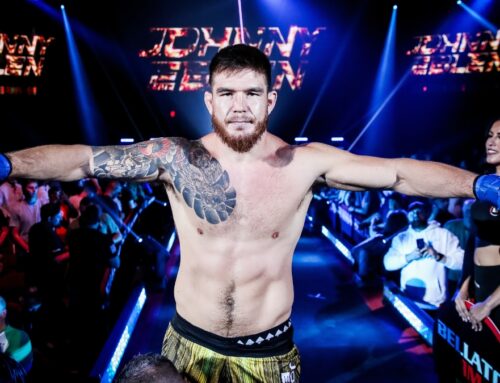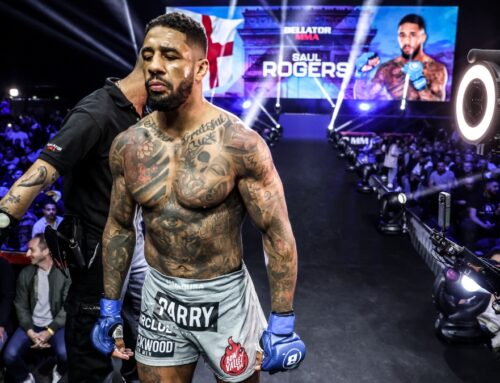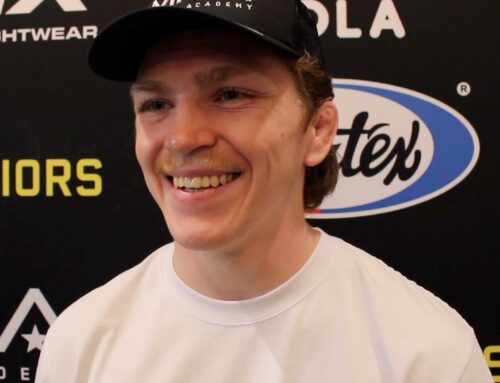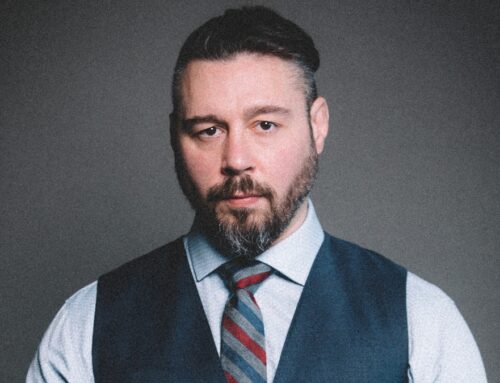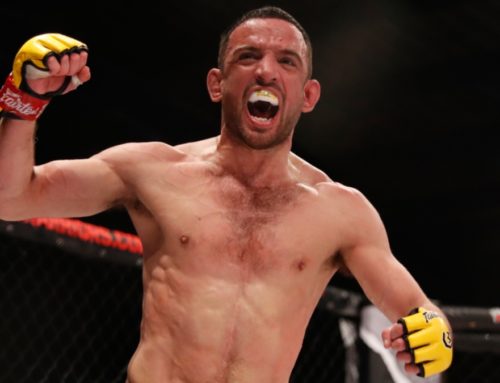It’s a bright spring morning and Tom Duquesnoy is relaxing at home in his Paris apartment. The French ‘Fire Kid’ has just returned home from a successful Octagon debut in which he eviscerated Patrick Williams with elbows and punches. Finally, after years of waiting, the whole world got to see what he showed in Europe during his 14-1 (1NC) run to become a two-division BAMMA champion.
The 23-year-old has been on matchmakers’ radars for years, but repeatedly turned down the advances of the biggest organizations in the world… until now. Now he’s begun to make a run at the highest level and blaze a trail to help MMA become recognized in his home country.
How did you start training MMA in a country where it’s banned?
Sounds kind of hard, right? I started fight sport with sambo combat at the age of 11 or 12. At that time I was renting some DVDs and VHS of Pride and the UFC and I was fascinated by it. I was looking at it with my dad and we got very passionate about Emelianenko Fedor. As MMA was prohibited before the age of 18, the goal was to be an MMA fighter and be as complete as possible by then.
Which disciplines did you specialize in?
I was doing all the sports. I got five national sambo titles. I had probably 100 wrestling matches and I went to the national podiums three times as well. I practiced grappling, jiu-jitsu and a mix of 35 fights in Muay Thai, boxing, savate and full-contact, which is the equivalent of American boxing. At 18 I got my degree and left for Paris where the best level of MMA in France is.
Was it difficult not being able to fight in France?
That was a good thing because it forced me to learn new languages, learn new cultures, discover new countries, meet new people and go out of my comfort zone fighting against strangers in their home at local shows. If you didn’t win by knockout, you’d probably lose by decision so you need to be the fighter I am – someone who’s trying the best he can to finish the fight. That’s the way to work.
Are fighters like you in the UFC important to help get MMA legalized?
It shows that we have a high level. Right now, because of the election in France, it means maybe new opportunities are possible. We’re working every day in order to make it legal and I will do everything I can because it’s my country. Hopefully one day we can do a UFC in Paris and I’m pretty sure I will fill the whole arena. In France, we were suffering from a bad image but people are getting smarter about it and see me and Francis (Ngannou) doing an amazing job and start to understand it’s a good sport.
Is there a lot of other talented French fighters?
When I was training in France, there was high-level judo, wrestling, boxing, judo, Muay Thai. We are a little bit late about the transition, but it’s getting better little by little. All the stuff makes us one of the greatest countries in Europe for MMA. Trust me, France will have high-level competitors.
How did you first meet your coach Bourama Traore, aka ‘The Man of Shadow’?
We met five months before my BAMMA debut. Something just clicked when I met him. We have a deep connection on life and way of thinking. He’s someone who likes travel, someone who considers himself an artist and he considers life as the way to deliver a performance by art. He’s like me. He’s a worker, he likes to be very calm, very quiet and working more than the trash talking. That’s the values I’m sharing with him. Before everything else, we are good friends.
How did you come to the decision to turn down a UFC offer when you were 19?
Since the very beginning of my career I’ve always made decisions by myself because I’m the only person to feel the things inside me. I always take advice from the close people around me. It gives me another way to think of things.
How many offers did you have?
It started the first time I got my world title at 145lb. I was receiving offers from everywhere in the world so that was really tempting, but the goal at that time was to get as much experience as I could to get to my best level and I was really focused on the UFC. I always kept a tight relationship. It was just a question of time. I was telling them: “I won’t sign anywhere else, let me do my thing and as soon as I am ready we’ll talk about a fight.”
How did you start training at Jackson-Wink MMA?
If you want to do Muay Thai, you go to Bangkok. If you want to do high-level jiu-jitsu, you go to Brazil. If you want to try and get the best MMA career, you have to go on the West Coast. I was doing a two-month trip on the West Coast in order to look for a team that was the best for me and where I would establish myself. I went to Las Vegas, I went to Los Angeles and I finished my trip with two weeks in Albuquerque. Once again, something just clicked over there.
What has training there added to your game?
I have a working visa now so I can stay constantly over there. Guys like Greg Jackson and Mike Winkeljohn have coached hundreds of fights, more than 100 in the UFC, and that’s important for me to be with people who have a lot of experience. From the very beginning I was watching UFC with my father and I always noticed that Greg Jackson was doing an excellent job. It was a dream to head to Albuquerque to see what it was all about. My coach, ‘The Man of Shadow’, joins me two months before each fight so it makes it even better. Right now, we are trying to do craftsmanship, a piece of artwork.
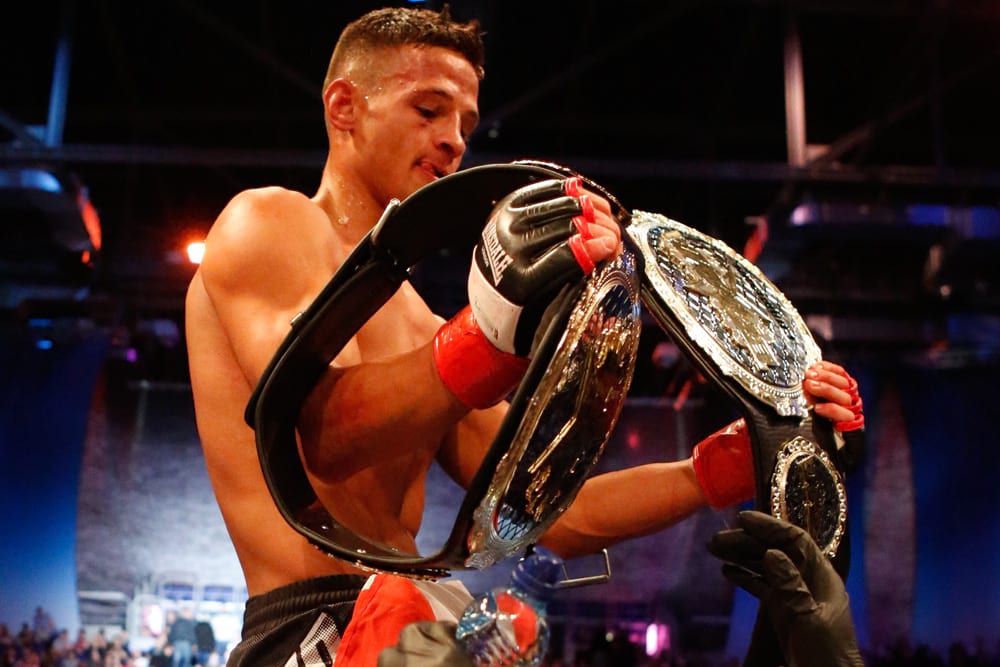
Does your experience as a two-weight BAMMA champion and training at Jackson-Wink mean you’re at a higher level than most UFC newcomers?
Year by year, camp by camp, day after day, I feel better. I’m a better fighter each fight and that’s the goal. That’s why I take my time. It’s just a process of trying to be the best. There’s an American expression: when you’re ready to be a professional, you can turn amateur; when you’re ready to be in the UFC, you can turn professional; and when you’re ready for the title of the UFC, you can go to the UFC. I always keep that in mind and that’s what works for the moment. Right now, I’m not that far from the level of the top fighters.
Do you think you can win the title within two years like Cody Garbrandt?
I think it’s possible. If I wasn’t confident about holding the UFC title, I wouldn’t make it. Now it’s a question of process. I’m still young. I want to take my time so I’m able to have a good life at the same time – focus on the destination but also the journey is very important. It’s important to take the time you need, chill and be better in each fight. Cody is a very high-level fighter: very smart, very strong, a high-level wrestler, and that right hand makes a difference. I respect that guy a lot, he has put on some very inspiring performances, and I hope if one day we get in a title fight against each other I will win. He did it in two years; that’s pretty impressive. I wish I will get the title in a fast process like him, but I will do it at my rhythm. No rush.
What do you think of some writers calling you ‘The Crown Prince of Violence’?
It’s a good way to call me. That’s funny. I like it. It must have been done by a good journalist.
Your offensive skills have been hailed, but your defense has been criticized by some people. Is that fair?
It is positive criticism. I’m very aggressive. It can be by weakness, but for the moment it’s more my strength because I win every fight. The defense is something I’m really focused on, but for the moment nobody tries to go forward against me – I mean, they try, but I always get the center of the Octagon and impose my style. I’m ready to defend, I’m improving my ground game every day with ‘Barata’, Rafael Freitas. For the moment, in order to deliver a good performance, it’s natural for me to do a lot of stuff in the striking game. I will improve it, I will try to make the weakness even smaller, but my style is my style. I won’t change it. I will evolve, but other than that, it’s good.
*** This feature first appeared in the August 2017 issue of Fighters Only ***
Pictures: Fred Guibs and Marc Moggridge

